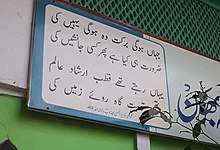Aziz al-Hasan Ghouri
Aziz al-Hasan Ghouri (also known as Aziz al-Hasan Majzoob or Khwaja Aziz al-Hasan)[1] (12 June 1884 – 17 August 1944) was an Indian Islamic scholar and poet. He was a disciple of Ashraf Ali Thanwi.[2] His four volume book Ashrafus Sawaneh is regarded as one of the primary sources for biography of Thanwi.[1][3]
Aziz al-Hasan Ghouri | |
|---|---|
 Couplets of Aziz a-Hasan Ghouri hanging in the khanqah of Thana Bhawan | |
| Personal | |
| Born | 12 June 1884 |
| Died | 17 August 1944 (aged 60) |
| Religion | Islam |
| Nationality | Indian |
| Muslim leader | |
| Disciple of | Ashraf Ali Thanwi |
Ashraf Ali Thanwi commended one couplet from Ghouri's poem Har Tamanna Dil Se Rukhsat Hogayi and said that if he had one hundred thousand rupees, he would give it to Ghouri.[4][5] This couplet has been deemed to be one of the 100 most popular Urdu couplets.[6]
Birth and education
Ghouri was born on 12 June 1884 in colonial India. He got BA and LLB from M.A.O. College, now Aligarh Muslim University.[1][7]
Career
Ghouri worked as deputy collector for 7 years[8] and later joined the Department of Education. He was the Deputy Inspector for Islamic madrassas and then became the Inspector of the English schools in Lucknow,[8] United Provinces of British India and retired only from this post.[7]
Ghouri was a poet and wrote in the ghazal, nazm, hamd and naat genre of Urdu poetry. He firstly used "Hasan" and then "Majzoob" as his poetic name. His poetic collection Kashkol-e-Majzoob was published in 1950.[4]
Ghouri's poem "Dars-e-Ibrat", "Jagah Ji Lagane Ki Dunya Nahi Hai" was released by Junaid Jamshed in his Jalwa-e-Janan album.
Literary works
Literary works of Ghouri include:[9]
- Kashkol-e-Majzoob
- Ashrafus-Sawaneh, biography of Ashraf Ali Thanwi.[10]
- Kalam-e-Majzoob
- PhooloN ki dali
- Sada-e-Majzoob
- Deewan-e-Majzoob
- Nafeer-e-Ghaib[11]
Recognition
Ghouri was honoured with titles of Khan Sahab and Khan Bahadur by the Government of British India.[4]
Death
Ghouri died on 17 August 1944.[1]
References
- Mohammed Parvez. A Study of the Socio-Religious Reforms of Maulana Ashraf Ali Thanvi (PDF). Department of Islamic Studies, Aligarh Muslim University. pp. 146–147. Retrieved 3 April 2020.
- Shaukat Thanwi. Sheesh Mahal (ebook) (in Urdu). p. 127. Retrieved 3 April 2020.
- Abdul Lateef Qasmi. "حکیم الامت حضرت مولانامحمد اشرف علی صاحب تھانوی کی کثرت تصانیف کے ظاہری اسباب". darululoom-deoband.com (in Urdu). Darul Uloom Deoband. Retrieved 3 April 2020.
- Faiz Qaziabadi. "Aziz al-Hasan Majzoob". kashmiruzma.net. Kashmir Uzma. Retrieved 3 April 2020.
- Shakeel Farooqi (11 March 2013). "Tazkirah Majzoob". express.pk. Retrieved 3 April 2020.
- "Read 100 popular Urdu couplets on the International Poetry Day". anynews.tv. Retrieved 3 April 2020.
- Muhammad Shamsul Haq. "Majzoob, Khwaja Aziz al-Hasan Ghouri". Paymana-e-Ghazal (Volume 1) (in Urdu). Islamabad: National Book Foundation. Retrieved 3 April 2020.
- "Notable students of Thanwi" (PDF). shodhganga. pp. 206–207. Retrieved 3 April 2020.
- "Urdu Books of Aziz al-Hasan Majzoob". Rekhta.org. Retrieved 3 April 2020.
- "MAULANA ASHRAF ALI THANVI: INFLUENCES" (PDF). shodhganga. p. 139. Retrieved 3 April 2020.
- "Nafeer-e-Ghaib" (PDF). archive.org. Retrieved 3 April 2020.